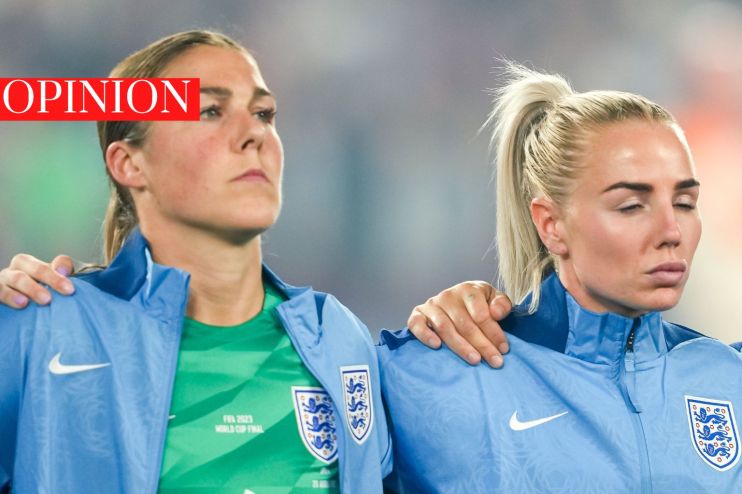Just do it: Nike fell off its virtuous high horse of inclusion during the World Cup

Nike has spent years trying to be the sports brand of choice and of inclusion. In the World Cup, it lost its moral foothold, writes Eliot Wilson.
Mary Queen of Scots was a football fan. She wrote about the game (or its antecedents), and the world’s oldest football was found stuck in the rafters of the Queen’s Chamber at Stirling Castle, which she left in 1547. But it has only been in the last 15 years that England’s national team has made its way to a decent share of public attention.
The Lionesses made the leap to national icons last year when they won the UEFA Women’s Championship. In front of nearly 90,000 spectators, at Wembley Stadium, playing the ancient enemy, Germany, they scored a fine 2-1 victory: football came home, but it took the women to bring it back.
All of this meant that the team’s steady progress through this summer’s FIFA Women’s World Cup in Australia and New Zealand was relished. Facing Spain in the final, they were defeated 1-0, but they went down hard, and they went down in English style. In the 68th minute, goalkeeper Mary Earps saved a penalty by Jenifer Hermaso, and a dam of adrenaline burst. Joyously she pounded her chest and bellowed “F*** off!” at the opposing team: not with venom but with the defiance of someone who has kept her team in the game.
Where sport goes, money marches in lockstep. Women’s football has an estimated 144 million fans in Europe, and the predictions are of massive growth with a young and diverse fanbase; last year a UEFA report suggested the women’s game could be worth £577bn in a decade, a sixfold increase. Ahead of the tournament, Orange commissioned Paris creative agency Marcel to produce a dazzling two-minute commercial trumpeting their support for the French national team.
It is a bonanza for sports manufacturers in particular. Nike has invested heavily in the women’s game, sponsoring 13 teams. But after the final, an extraordinary fact came to light. Nike did not offer a replica goalkeeper’s shirt for Earps’s armies of fans to buy.
Nike CEO John Donahue had proclaimed his brand was “proud to partner” with so many of the teams in the World Cup. Acknowledging the thrum of excitement, he said “we’ve matched that energy with our most comprehensive women’s football collection ever”. But producing goalkeepers’ shirts was not part of Nike’s commercial strategy.
The astonishment which greeted this omission after Earps’s heroic performance was substantial, and visceral. Her Manchester United team shirt had sold out the previous season. Fans rushed to social media to express their sheer bewilderment, while David Seaman, who appeared between the sticks 75 times between 1988 and 2002 for the men’s national team, tweeted sardonically “Bet @Nike are regretting not selling the #maryearps shirt now”. An online petition urging Nike to change its mind now has 160,000 signatures.
Nike, which celebrates its 60th birthday next year, can feel how the wind is blowing, and quickly pledged to supply “limited quantities” of goalkeepers jerseys. With a degree of contrition, a spokesman said “We recognise that …we didn’t serve those fans who wished to show their passion and support to the squad’s goalkeepers”. But its initial response had been vague and halting, and Earps responded dryly on Instagram, “@Nike is this your version of an apology/taking accountability/a powerful statement of intent?”
It is a plain commercial fact that goalkeepers’ shirts are challenging; they require special production runs and appeal only to one section of the public. The decision not to offer them taken before the tournament should have been flagged within Nike—perhaps it was—and public dismay should have been recognised immediately and handled with more grace.
But there is a more profound lesson here. Nike does not present its sponsorship of women’s football in purely commercial terms. Instead it dwells heavily on inspiration and equality. It seeks “to celebrate the outrageous confidence and skill of women today and the girls that will change the game tomorrow” and talks about “dreams come true”.
The commitment to equality is stirring but advertising is a cynical business; if you are going to reach out to an audience you want to inspire as well as take money from, you have to look like you mean it. As the great Tory orator F.E. Smith once remarked of David Lloyd George: “I do not, more than another man, mind being cheated at cards; but I find it a little nauseating if my opponent then publicly ascribes his success to the partnership of the Most High.”
Businesses should be in a comfortably virtuous circle. Customers will pay, often above a strictly commercial rate, for a product which resonates with them. The endlessly self-referential General Z is quite explicit in saying what it looks for in a business. It is simply good sense to listen to them and pretend to care while supplying their commercial needs. Nike can’t afford to step so clumsily again, because there is always a competitor willing to step over you. As the company says, just do it.